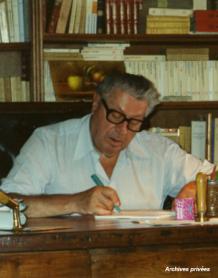Henri Troyat, écrivain

Lev Aslanovitch Tarassoff naît à Moscou le 1er novembre 1911 de parents ayant des origines arméniennes, tcherkesses et géorgiennes. Sa famille est riche et il grandit dans l’aisance jusqu’à ce que, menacée de mort par la police politique bolchevique, sa famille soit contrainte à la fuite. Il a alors six ans.
La famille Tarassof entreprend un long exode de Moscou au Caucase, du Caucase en Crimée, puis, par la mer Noire, à Constantinople, suivant l’armée blanche défaite du général Wrangel. Elle arrive à Paris en 1920 et ses membres se voient reconnaître le statut Nansen et placés sous la protection de l’Office des réfugiés russes.
En France Lev Tarassoff publie son premier roman, Faux jour, en 1935 sous le nom d’Henri Troyat. L’écrivain est né. Il ne cessera plus d’écrire et de publier romans et biographies, cent-quatre ouvrages au total, dont beaucoup traitent des relations entre la Russie et la France. Il est le plus jeune lauréat du prix Goncourt, pour son roman L’Araigne, et l’un des plus jeunes membres de l’Académie française où il est élu en 1959, à l’âge de 48 ans. Il est, lui qui revendiquait « le droit singulier de n’être qu’un conteur », l’un des écrivains le plus aimé des Français.
Invité par le président de l’Assemblée nationale à prononcer un discours à la tribune pour le 50e anniversaire de la convention de Genève relative au statut des réfugiés, Troyat déclare :
Si j’ai demandé ma naturalisation, à l’âge de vingt deux ans, c’est pour témoigner mon amour d’adopté tardif envers l’adoptant qui m’avait fait confiance. Aussi ai-je envie de dire aux réfugiés venus des quatre coins du monde et dont certains ont dû tout abandonner pour sauver leur vie que l’exil n’est pas une fin en soi. Quelle que soit la tragédie dont ils ont été les victimes…ils trouveront en France compréhension et hospitalité, pour peu qu’ils acceptent de s’adapter à l’esprit et aux usages de cette très ancienne terre d’asile.
Henri Troyat est décédé en 2007. Il était Grand-croix de la Légion d'honneur, Commandeur de l’ordre national du Mérite et Commandeur des Arts et des Lettres.
Il a raconté sa vie dans Un si long chemin (1976, J’ai Lu) et, par la fiction, dans Le fils du satrape (1998, le Livre de poche).